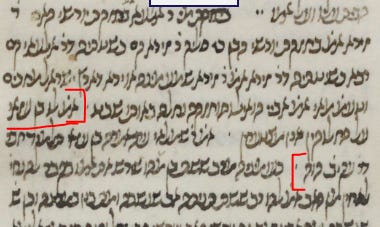How Was Ben Azzai Rude?
In the daf for Shabbat, Bava Batra 158b, the Mishnah had this interaction between Ben Azzai and Rabbi Akiva. Recall that in the past few Mishnaic disputes, Beit Shammai said yachloku, they split it, while Bet Hillel left the property with the muchzak. Now, this new case.
מַתְנִי׳ נָפַל הַבַּיִת עָלָיו וְעַל אִמּוֹ, אֵלּוּ וָאֵלּוּ מוֹדִין שֶׁיַּחְלוֹקוּ. אָמַר רַבִּי עֲקִיבָא: מוֹדֶה אֲנִי בָּזוֹ, שֶׁהַנְּכָסִים בְּחֶזְקָתָן. אָמַר לוֹ בֶּן עַזַּאי: עַל [הַ]חֲלוּקִין אָנוּ מִצְטַעֲרִין; אֶלָּא שֶׁבָּאתָ לְחַלֵּק עָלֵינוּ אֶת הַשָּׁוִין?!
MISHNA: If the house collapsed on a son and upon his mother, and it is unknown who died first, the following claims arise: The mother’s paternal family claims that the son died first, and therefore they inherit from the mother, and the son’s heirs claim that the mother died first and her son inherited from her, and therefore they inherit from the son. In this case, both these Sages and those Sages, Beit Shammai and Beit Hillel, concede that they divide the property between them. Rabbi Akiva said: In this case I concede that the property retains its previous ownership status. Ben Azzai said to Rabbi Akiva: We are already troubled by those cases where Beit Shammai and Beit Hillel are in disagreement. But do you come to bring upon us a disagreement with regard to the case where they agree?
That is great wordplay, where Rabbi Akiva is saying yachloku, and so Ben Azzai was worried about the previous disputes (chalukin) and now Rabbi Akiva comes lechalek, to make a new division to say that they don’t split.
Anyway, there is Amoraic reaction to this exchange.
אָמַר לוֹ בֶּן עַזַּאי: עַל הַחֲלוּקִין אָנוּ מִצְטַעֲרִין וְכוּ׳. אָמַר רַבִּי שִׂמְלַאי, עֲדָא אָמְרָה – בֶּן עַזַּאי תַּלְמִיד חָבֵר דְּרַבִּי עֲקִיבָא הֲוָה, דְּקָאָמַר לֵיהּ ״שֶׁבָּאתָ״.
The mishna teaches: Ben Azzai said to Rabbi Akiva: We are already troubled by those cases where Beit Shammai and Beit Hillel are in disagreement. But do you come to bring upon us a disagreement with regard to the case where they agree? Rabbi Shamlai said: That is to say that ben Azzai was a disciple-colleague of Rabbi Akiva and not just a disciple, since he said to him: Do you come, in the second person, rather than using the more formal third person.
It is interesting what Artscroll does in a footnote. Right before דְּקָאָמַר לֵיהּ ״שֶׁבָּאתָ״ they have a footnote saying that it because he used “you”. But the footnote just echoes the plain text of the gemara. They say this because they are using Rashbam as a guide, and Rashbam says this as well:
תלמיד חבר - פשיטא לן דמתחלה היה תלמידו והדא אמרה דלבסוף היה חבירו דקאמר ליה שבאת ולא קאמר שבא רבינו:
That is: It is obvious to us that initially he was a student, and this (hada - cognate of ‘ada) tells thus that eventually he became his colleague since he says to him שבאת, that “do you come”, and not “does Rabbeinu come”.
Doesn’t this echo the text of the gemara rather clearly. Why explain this?
Secondly, even if he said “does Rabbeinu come”, would that have been better. Consider the tone of the rest of his words? We’re pained enough with this? Now Rebbe has to come and add to our suffering?! Would that really be a polite thing for a student to say to his teacher?
Finally, consider Rabbeinu Gershom (or, as his colleagues referred to him, You Gershom):
אנו מצטערין. דאיכא מחלוקת דלא מצינן למיקם אליבא דהלכתא מפני מחלקותם אלא שבאת לחלוק עלינו את השוין דלא סבירא לך כוותייהו דיחלוקו: אמר ר' שמלאי מדקאמר ליה בן עזאי כך לר' עקיבא בלשון הטוח ולא אמר ליה בלשון כבוד ש"מ דבן עזאי תלמיד חבר היה של ר' עקיבא משום הכי לא חלק לו כבוד כל כך שהלכו שניהן ללמוד תורה לפני ר' אליעזר הגדול ולפי שהיה בן עזאי בחור לא היה יכול לסבור סברא כר' עקיבא בתלמוד וגמר גמרא והדר הלך בן עזאי לפני ר' עקיבא להסביר סברא:
That is, since Ben Azzai spoke to Rabbi Akiva in a harsh tone and didn’t speak to him (even to disagree) in an honorable tone, we can deduce that they were colleagues. So he taps the tone.
This is strange, because doesn’t it go against the gemara, which tapped the words שבאת, that you came?
The answer to all of this, I think, is that the gemara did not initially have this whole conversation. Rather, look to Escorial and Paris 1337 manuscripts.
All the other texts that had that (questionable IMHO) explanation in the Talmudic text got it from a peirush and embedded it.
This might relate to developed attitudes towards addressing one’s teacher. I recall (unfortunately fuzzily) Rav Schachter telling us, either about himself or about the Rav, that people said “does the Rav / the Rebbe think…” in third-person and he was confused, who was being addressed. This can relate to the question of whether Mar must be used to address a teacher / if Mar does appear, could it be a colleague, e.g. here.



